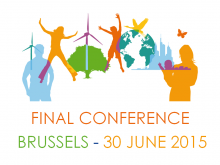The CECILIA2050 research project is entering its last and third year and is preparing to focus on its ultimate goal of formulating near-term and medium-term policy recommendations: how could and should the EU climate policy mix evolve to put the EU on track towards a low-carbon economy? What is the role for economic instruments (carbon pricing) in the policy mix, and for which decisions are planning tools necessary? How should climate and energy policy should interact? Read more
News
This paper discusses two plausible policy scenarios that aim at mitigating global warming during the next decades and compares them to a third business as usual scenario. The different policy options underlying these scenarios are evaluated by assessing their direct and indirect economic and environmental effects until the year 2050 by applying the global economic environmental model GINFORS. The simulations with GINFORS show that the climate targets set in the different scenarios can be reached with conventional technologies. A downloadable version as well as more information about this report can be found here. Read more
From 16th to 17th October 2014 Stefania Munaretto and Henriette Walz from the Institute for Environmental Studies of the VU University Amsterdam and other members of the CECILIA2050 consortium organized a policy exercise in Brussels on questions surrounding the future of the European Emissions Trading Scheme (EU ETS). Read more
This new report synthesises the outputs from the series of sector‐specific and cross‐sectoral studies produced by the CECILIA2050 consortium under Work Package 2 – ‘Understanding the Impacts and Limitations of the Current Instrument Mix in Detail’ of the CECILIA2050 project. The report can be downloaded in the publication section of this website. Read more
At the 5th World Congress of Environmental and Resource Economists, held in Istanbul between 28th June and 2nd July 2014, the CECILIA2050 consortia organised a policy session to discuss the perspectives of EU Climate Policy for 2030 and beyond. The session featured four distinguished panelists: Andreas Barkmann (European Environment Agency), Aldo Ravazzi (Italian Ministry of the Environment), Paul Ekins (University College London) and Andrew Błachowicz (Climate Strategies), moderated by Benjamin Görlach of the Ecologic Institute. Read more
This CECILIA2050 report examines the implications of imposing an 80% reduction of EU CO2 emissions on the Union’s energy system and attempts to project the most cost-effective transformation pathway to achieve this goal using the recently developed European TIMES Model (ETM-UCL). Read more
On the 15th May 2014, the CECILIA2050 consortia organises a new workshop at the University College London that will address the relationship between finance and eco-innovation. The workshop will feature eight sessions that will discuss amongst others the effects of financial constraints and barriers on eco-innovation, the role of subsides for different fields of eco-innovation, and the microeconomics of Green finance and eco-innovation. Two speakers will also specifically address the question of how to transform the current economy into a greener low carbon economy. Read more
This report assesses whether and to what extent energy and environmental policy instruments have been relevant forces behind the adoption of environmental innovations in the EU. The report takes a sectoral perspective that is theoretically based on neo Schumpeterian evolutionary theory to qualitatively investigate the factors that characterise the adoption of techno-organisational innovations aimed at enhancing energy efficiency and abating CO2 through interviews with industry representatives of key EU sectors. The interview-based analysis is complemented by econometric evidence on the policy drivers of eco-innovation at the sector level. The Industry’s views are integrated with a ‘stakeholder based’ analysis drawing upon on unions and policy makers’ views on the challenges faced by a greener economy. In total, the analysis provides bottom up and ex post based knowledge on both successful and undermining factors of the existent policy mix in EU countries, and provides consequent recommendations to ameliorate the (design of) the policy package. The full report can be found and downloaded here. Read more
The report assesses the current greenhouse gas (GHG) mitigation policy instruments in food and agriculture in the European Union (EU) based on the criteria developed in Task 1.1 of the CECILIA2050 project and covers the three dimensions: environmental effectiveness, economic efficiency, and feasibility. On the basis of the instrument mix indentified in Task 1.2 of the CECILIA2050 project the assessment was carried out in a sample of four Member States including the UK, the Netherlands, Spain and Italy. The assessment is based on a comprehensive review of literature as well as on interviews with key stakeholders from the four case study countries and includes policy instruments that focus on both, the producer and the consumer. Read more
The report analyses to which extent key climate policies in the European Union (EU) influenced the development of the EU’s power sector. The paper assesses in particular the impact of the EU Emission Trading System (ETS), the Renewable Electricity Directive and the Renewable Energy Directive on various aspects of the power sector including electricity generation, electricity capacity, electricity prices, electricity trading, and emissions abatement in the EU and selected member states. Read more


